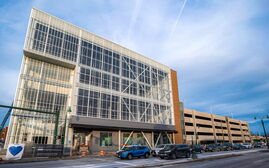Processing Your Payment
Please do not leave this page until complete. This can take a few moments.
Cash crunch: FAME takes more risks than ever to help businesses weather the pandemic
 Photo / Tim Greenway
Finance Authority of Maine CEO Bruce Wagner and Director of Business Programs Jennifer Cummings. FAME saw so much demand for the “COVID-19-enhanced” business relief programs that it extended them through March 2021.
Photo / Tim Greenway
Finance Authority of Maine CEO Bruce Wagner and Director of Business Programs Jennifer Cummings. FAME saw so much demand for the “COVID-19-enhanced” business relief programs that it extended them through March 2021.
The start of the pandemic meant the disappearance of almost all of Armstrong Landscaping and Excavating’s springtime contracts.
The company, in the Knox County town of Washington, was founded in 1999 by 24-year Army veteran Christopher Armstrong.
Over the years, Armstrong expanded the firm from landscaping to excavation, plowing and sanding, and services ranging from the installation of septic systems and underground power lines to the construction of house lots.
This past March, though, things got rough.
“When the pandemic first started, there was lot of canceling and postponing,” Armstrong says. “We do a lot of mowing at the camps here, but nothing opened. That didn’t help.”
Armstrong got by at first with some previous contracts, by using operating funds for payroll and, soon, by selling one of his bucket loaders to drum up cash.
“It was very tight there for a while,” he says.
Armstrong approached the Finance Authority of Maine, or FAME, to see what kind of assistance might be available to help small businesses like his weather the crisis. He was connected with one of FAME’s commercial loan officers, Matt Lindquist, who guided Armstrong through the agency’s COVID-19 direct loan program, which FAME had newly implemented with special terms designed to help as many businesses as possible.
“Matt made it a pretty easy process,” says Armstrong.
For Armstrong, a $20,000 loan through the program made all the difference to keep operations going and his crew paid until business picked up again in July.
“It was just enough to get us past that patch,” says Armstrong. “We were able to breathe, anyway.”
FAME established this and other programs that respond to the COVID-19 crisis for exactly that reason – to give businesses breathing space.
“Right now we’re taking more risk than ever in our history,” says FAME CEO Bruce Wagner. “There can’t be a time more important than this pandemic for us to take a risk for public benefit. These are dire circumstances.”
Quick response
In February, FAME contacted its lending partners to get an understanding of what they were seeing in the market and what FAME could do to help, says Jennifer Cummings, FAME’s director of business programs.
In March, FAME announced it would collaborate with Maine lenders to offer special, limited-time direct loans and loan insurance to eligible Maine businesses affected by COVID-19.
“We really were able to react quickly” to help businesses across Maine, including those FAME had already been working with through its commercial lending partners and through its direct loan portfolios, says Cummings.
The programs offer special terms to Maine-based businesses that have experienced interruption or hardship due to COVID-19.
Benefits include:
- Direct loans up to $50,000 offered at reduced interest rates and fees
- Six months interest-only payments
- Up to 75% pro-rata loan insurance on loans up to $250,000.
“Pro rata,” or “pro-rated,” means the insurance covers a percentage of the lender’s loss after a default and liquidation.
Originally scheduled to run out on Sept. 30, the business relief programs have been in such demand that FAME extended them through March 31, 2021.
The six-month extension was made “due to the lingering economic effects of the pandemic, as well as continued federal, state and regulatory economic stimulus programs, lender partner feedback, and our belief that credit impacts on borrowers are likely to manifest themselves in the coming six months,” according to a statement by Jay Violette, chairman of FAME’s board of directors.
$40 million reserve
Originally financed by taxpayers, FAME has over the years accumulated a reserve of $40 million that today funds its business finance programs. The reserve continually replenishes as loans are paid back.
From that $40 million reserve and in response to the struggles businesses were facing as a result of the pandemic, FAME set aside $5 million to bolster its direct loan program.
Through the COVID-19-enhanced direct loan program, FAME originated eight times more loans than it did during the same period in 2019, giving loans to 79 businesses and using $3.2 million of the $5 million allocation. From April through June, the program provided payment deferrals to 36% of its borrowers in its direct loan portfolio.
FAME steered another $10 million from the reserve toward buttressing its commercial loan insurance program, using $1.1 million so far (a figure that represents existing exposure that FAME has approved, and could end up paying out in insurance claims at some point in the future).
The COVID-19-enhanced commercial loan insurance program offers certain concessions to borrowers, including deferrals or interest-only loans from lenders that FAME works with, Cummings says. Some 182 businesses have received loan deferrals through the COVID-19 program.
Spread the resources
FAME tailored its programs to help as many borrowers as possible without running out of money.
“The way we approached it was to limit the amount per borrower, so we could spread our resources among as many businesses as we could,” Cummings says of the COVID-19 direct loan program.
Most businesses taking advantage of the programs have been in the hospitality industry, including lodgings, restaurants and retail, as well as day care centers.
The program was so active that FAME hired an additional contract employee to support the effort.
Activity slowed considerably when the federal government established the Paycheck Protection Program, which provided business loans that were forgiven if certain requirements were met.
“Even though our interest rates were low or deferred, it was still a loan,” Wagner says. “The feds were really giving out free money, so our activity level dropped. Now we’re watching very closely, because unless there’s another tranche of federal money, we’ll be very active again.”
With a total of $15 million allocated for both programs, about $7 million remains, most on the commercial loan insurance side.
Many unknowns
The effort continues.
“We’re ready for a slew of new requests,” says Cummings.
The next phase includes helping businesses that obtained one-year loans with six-month interest-only payment periods to navigate the post-six-month period.
“That six months is coming up now,” says Cummings. FAME is considering an extension to the interest-only payment option, she adds.
Also on offer is a 50% loan insurance program to banks that don’t already have a relationship with FAME, to help them refinance existing loans with borrowers struggling to make payments.
“That takes half the risk off the banks and credit unions, which will allow them to help more businesses and leverage their dollars further,” says Cummings. “We’re tailoring that to our existing program and increasing our exposure.”
Because borrowers have received payment deferrals and are therefore not defaulting on their loans, FAME’s reserve has held out.
“But that could change,” says Wagner. “This situation remains unpredictable as it continues, and we could be under strain at some point.”
If FAME exhausts its reserve, it could return to the state government to see if there’s any money available, he added.
“There’s a lot of uncertainty for us,” Wagner says.
Planning continues for the future.
“If we get another surge in demand, and if the feds don’t have another tranche of money, we’re gearing up to do more loan applications online, so they’re automatic and so the process goes very quickly, for loan guarantees in particular,” says Wagner. “We had to hire an individual to meet demand during the first cycle and we’re trying to bulk up within existing resources for now to get ready for a second one.”
Says Cummings, “For us, there are so many unknowns. Some businesses have fared better than others. Those that are still hanging on hopefully have the means and the resources to allow them to continue operations through the remaining uncertainty. We’re trying to be there to support them as best we’re able.”














0 Comments